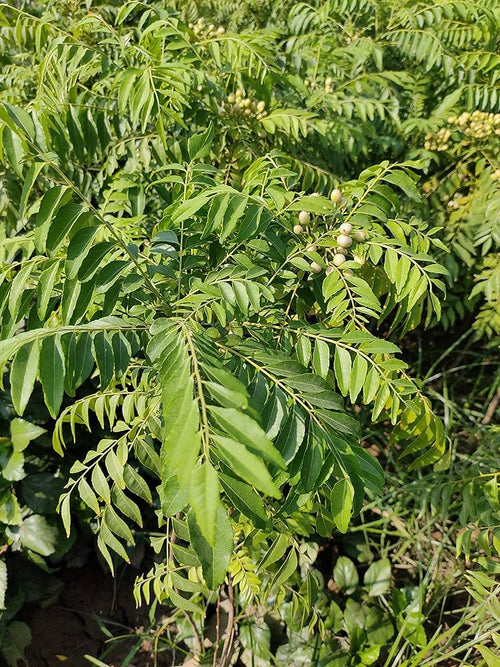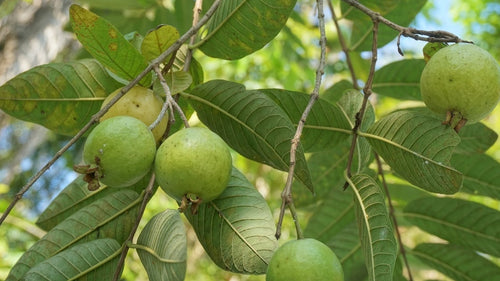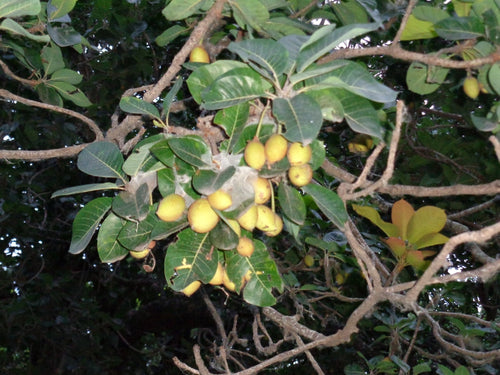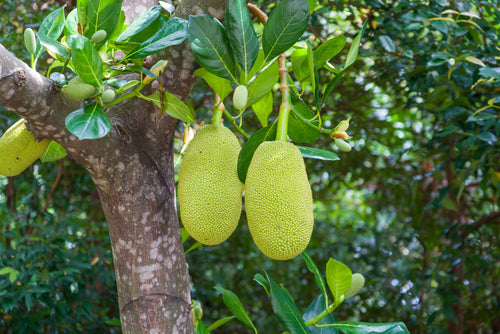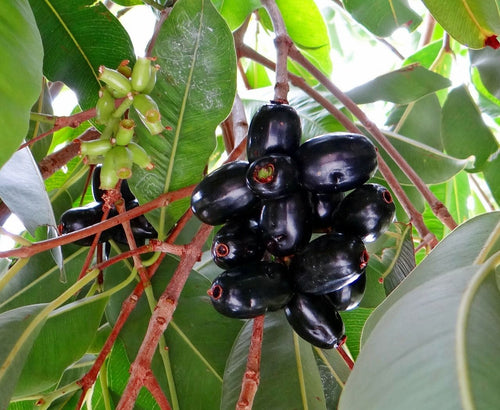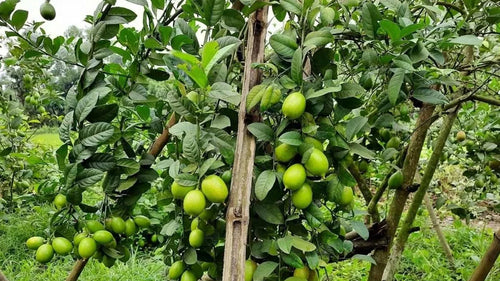Nurture Florest - An Initiative by Mankind Pharma
Mankind Pharma is one of India’s leading pharmaceutical companies, renowned for its commitment to improving the quality of life through affordable and Read more
Plantation Site Gallery
Project Update 4
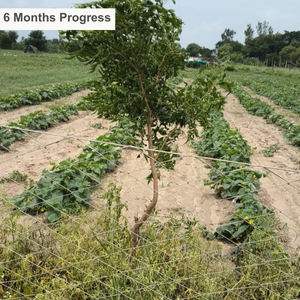
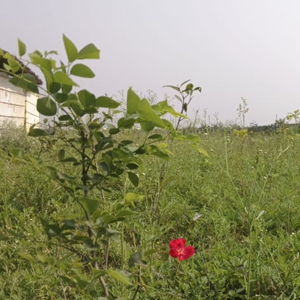
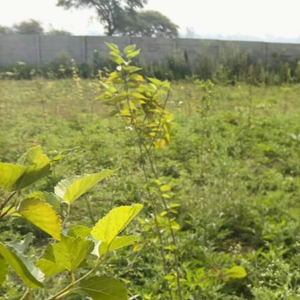
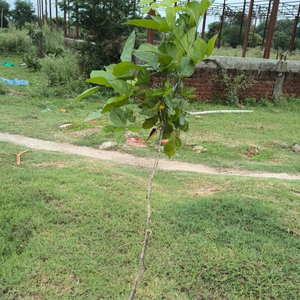
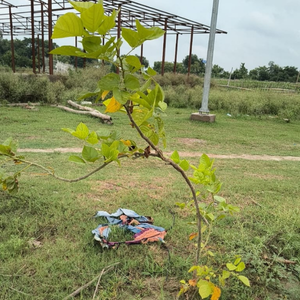
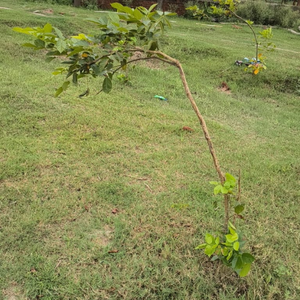
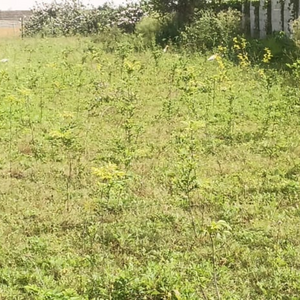
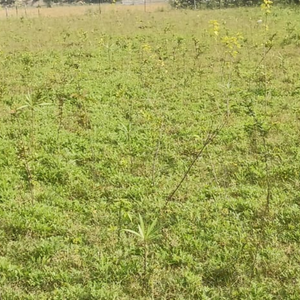
Project Update 3
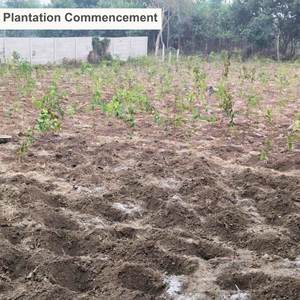
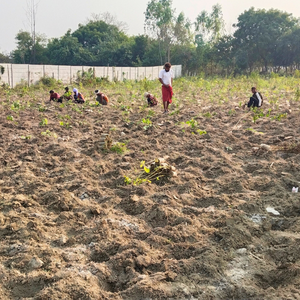
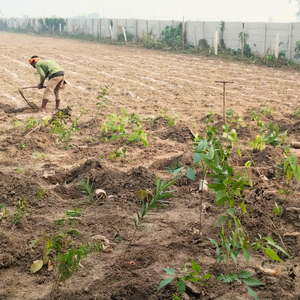
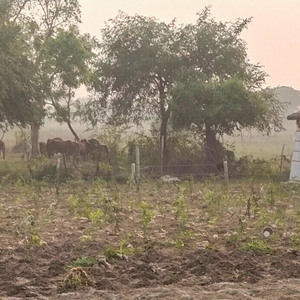
Project Update 2
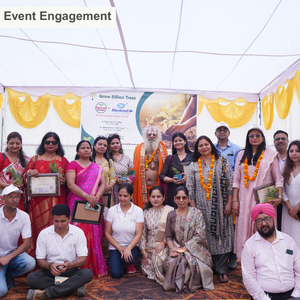
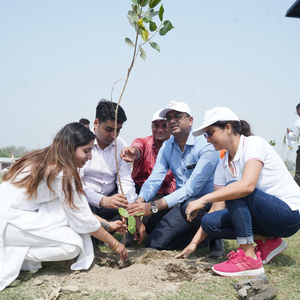
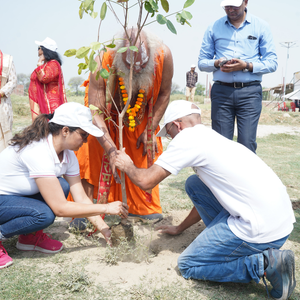
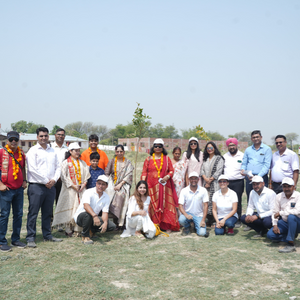

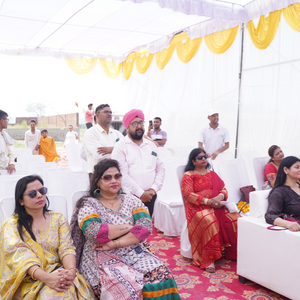
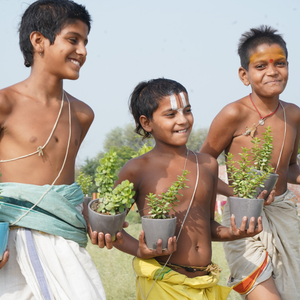
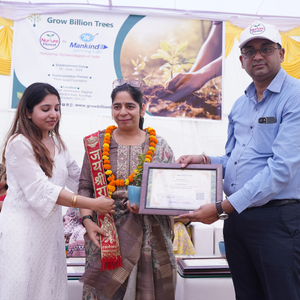
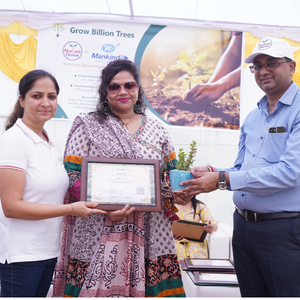
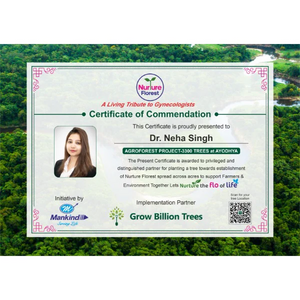
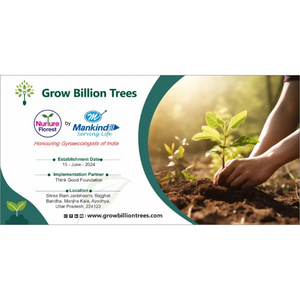
Project Update 1
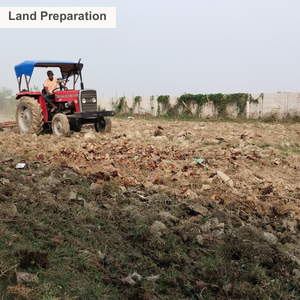
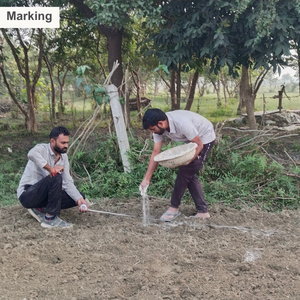
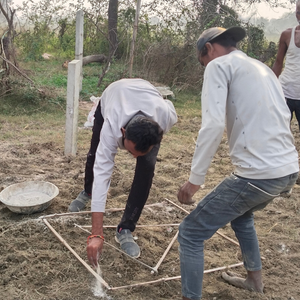
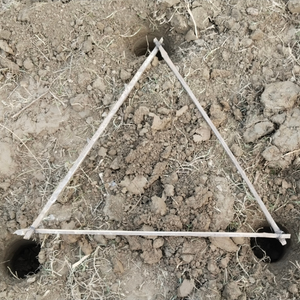
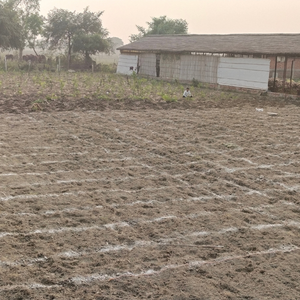
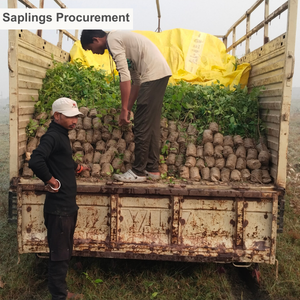
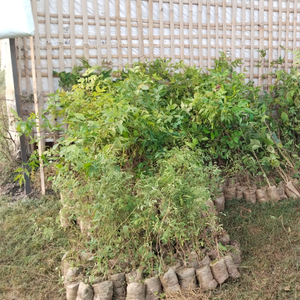
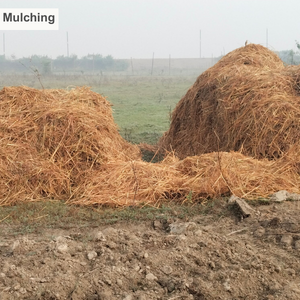
Digital Forest
Forest with 3,204 Trees planted
Want to plant your tree now?
Plant a Tree @ 299Nurture Florest - An Initiative by Mankind Pharma
Mankind Pharma is one of India’s leading pharmaceutical companies, renowned for its commitment to improving the quality of life through affordable and innovative healthcare solutions. Established in 1995 with a mission to serve humanity, the company has earned a reputation for excellence in research, development, and manufacturing of various pharmaceuticals, including prescription medicines, over-the-counter products, and wellness solutions.
Beyond its achievements in the healthcare sector, Mankind Pharma actively contributes to sustainable development through its corporate social responsibility (CSR) initiatives. The company focuses on environmental sustainability, community welfare, and promoting green practices. Its ethos of "Serving Life" is reflected in projects like agroforestry and large-scale tree plantation initiatives, which aim to enhance both ecological balance and community well-being.
Mankind Pharma places high importance on creating a positive impact on society and the environment, demonstrating a strong commitment to sustainable practices and corporate social responsibility. The inclusion of plantations within the Gurukul premises further reinforces this commitment, offering educational and sustainable learning opportunities. These green spaces serve as living classrooms where students and the broader community can engage with the importance of environmental preservation and gain practical knowledge of agroforestry techniques and sustainable land management.
Mankind Pharma’s green initiative, The Nurture Florest, saw a collective of dedicated gynecologists come together to plant trees in an agroforestry format, weaving sustainability into healthcare. Part of the ongoing campaign “Nurture the Flo of Life”, this initiative underscores a commitment to fostering life in more ways than one. By integrating trees with agricultural landscapes, The Nurture Florest not only enhances biodiversity and soil health but also serves as a living reminder of the nurturing role gynecologists play. Through this unique collaboration, Mankind Pharma and its healthcare partners promote environmental stewardship while contributing positively to local farming communities.
Community Forest Project Planning & Execution
No. of trees: 2100 Trees
Plantation Location: Shri Ram Janambhoomi, Rajghat Bandha, Manjha Kala, Ayodhya, Uttar Pradesh-224123
Plantation Duration: June 5th, 2024 to June 15th, 2024
Names of Species: Teak, Khamir, Shisham, Kadamb, Apple Ber, Imali, Sehtut, Drumstick, Gulmohar, Temoko, Karonda, Kaner, Kesiyasayma, Shiras, Amaltash, Mahua, Pipal, Neem, Bargad, Shami, Palash, Ray Jamun, Guava, Custard Apple, Anar, Lemon, Gudhal, Badam, Harsingar, Pilkhan, Jackfruit, Bakayan Neem, Balm Khira, Belpatra, Sindure, Bamboo, Mahoguni, Kher, Desi Gulab, Aloveera, Ashok, Kachnar, Jacrenda, Gular
Species Selection & Its Benefits:
For Mankind, Pharma’s community forest initiative, species selection was carefully made to promote a diverse, sustainable ecosystem that supports both environmental restoration and community well-being. A mix of native and fruit-bearing species was chosen, with consideration for their ecological adaptability, soil improvement properties, and ability to provide benefits to the local population.
The selected species, such as Neem, Peepal, Jamun, and Mahua, were picked to thrive in the local conditions, enrich biodiversity, and attract essential wildlife like pollinators and birds. The selected species, such as Teak, Neem, Shisham, and Mahua, provide a range of ecological and economic benefits. Teak is valued for its high-quality timber, making it an excellent choice for commercial forestry. Neem is known for its natural pest control properties and medicinal uses, while Shisham offers strong, durable wood for construction and furniture making. Mahua, on the other hand, has multipurpose uses, from medicinal benefits to providing edible flowers and seeds.
Including native species like Pipal, Kadamb, and Bargad enhances soil fertility, promotes biodiversity, and stabilizes the ecosystem by supporting a variety of wildlife. Bamboo is an efficient species for soil erosion control and can be used for construction materials, paper production, and even as a sustainable biofuel. Species like Guava, Lemon, and Jackfruit contribute not only to food security by providing fruits but also help in improving soil structure and water retention.
Overall, selecting a mix of tree species with complementary characteristics—such as nitrogen fixation, pest control, water retention —creates a balanced community forest system that enhances both agricultural productivity and environmental health. The diversity of plant species also improves resilience to pests, diseases, and changing weather conditions, making the system more adaptable and sustainable in the long run.
|
Sr. No. |
Plant Name |
Ecological Benefit |
Social Benefit |
|
1 |
Teak |
Helps prevent soil erosion |
Provides valuable timber for construction |
|
2 |
Khamir |
Promotes eco-friendly material use |
Supports local artisans and communities |
|
3 |
Shisham |
Improves soil fertility |
Provides timber for furniture and construction |
|
4 |
Kadamb |
Supports groundwater recharge |
Holds cultural significance |
|
5 |
Apple Ber |
Enhances soil stability |
Provides nutritious fruits for local diets |
|
6 |
Imali |
Improves soil quality |
Offers edible fruit and medicinal uses |
|
7 |
Sehtut |
Supports silkworms and biodiversity |
Contributes to silk production and income |
|
8 |
Drumstick |
Prevents soil erosion and improves fertility |
Highly nutritious, aids local health |
|
9 |
Gulmohar |
Reduces urban heat |
Beautifies public spaces and parks |
|
10 |
Temoko |
Supports pollinators and fertility |
Offers unique fruit for local consumption |
|
11 |
Karonda |
Prevents soil erosion |
Provides nutritious fruits for locals |
|
12 |
Kaner |
Tolerates drought, stabilizes soil |
Used in traditional medicine and decor |
|
13 |
Kesiyasayma |
Enhances biodiversity and soil health |
Supports local livelihoods and industries |
|
14 |
Shiras |
Prevents soil erosion and enhances fertility |
Provides timber and forest products |
|
15 |
Amaltash |
Improves soil fertility and stabilizes land |
Provides medicinal value and vibrant flowers |
|
16 |
Mahua |
Supports soil conservation |
Provides edible flowers and oil |
|
17 |
Pipal |
Improves air quality, supports wildlife |
Holds spiritual significance, provides shade |
|
18 |
Neem |
Purifies air, prevents soil erosion |
Used in medicine, pest control, and health |
|
19 |
Bargad |
Provides shelter for wildlife |
Holds religious importance and provides shade |
|
20 |
Shami |
Prevents desertification, improves soil |
Provides fuelwood, shade, and medicinal uses |
|
21 |
Palash |
Improves soil fertility |
Used in traditional festivals and rituals |
|
22 |
Ray Jamun |
Supports biodiversity and water conservation |
Provides edible fruit for local consumption |
|
23 |
Guava |
Improves soil fertility |
Provides nutritious fruit, supports health |
|
24 |
Custard Apple |
Enhances soil fertility |
Provides sweet fruit for local diets |
|
25 |
Anar |
Improves soil quality |
Provides nutritious fruit and medicinal uses |
|
26 |
Lemon |
Supports pollination and improves soil health |
Provides vitamin-rich fruit for local use |
|
27 |
Gudhal |
Helps improve soil health |
Used for ornamental purposes and medicine |
|
28 |
Badam |
Improves soil fertility and water retention |
Provides edible nuts, supports economy |
|
29 |
Harsingar |
Enhances soil quality |
Used in traditional medicine and rituals |
|
30 |
Pilkhan |
Supports biodiversity and soil health |
Provides shade and medicinal uses |
|
31 |
Jackfruit |
Enhances soil fertility and stabilizes land |
Provides nutritious fruit and income |
|
32 |
Bakayan Neem |
Improves soil health and air quality |
Provides medicinal properties and shade |
|
33 |
Balm Khira |
Improves soil quality |
Supports local agriculture and nutrition |
|
34 |
Belpatra |
Enhances soil fertility |
Used in religious rituals and medicine |
|
35 |
Sindure |
Improves soil health |
Used for cultural and medicinal purposes |
|
36 |
Bamboo |
Improves soil stability, prevents erosion |
Provides materials for construction and crafts |
|
37 |
Mahoguni |
Helps prevent soil erosion and maintain soil |
Provides valuable timber for furniture |
|
38 |
Kher |
Stabilizes soil and prevents erosion |
Used for fuelwood and medicinal purposes |
|
39 |
Desi Gulab |
Enhances soil fertility |
Used in perfumes, health products, and rituals |
|
40 |
Aloveera |
Improves soil and prevents erosion |
Provides medicinal and cosmetic products |
|
41 |
Ashok |
Supports biodiversity and improves soil health |
Used for medicinal purposes and spiritual use |
|
42 |
Kachnar |
Improves soil quality |
Provides medicinal flowers and shade |
|
43 |
Jacrenda |
Supports soil fertility and water retention |
Provides shade and ornamental value |
|
44 |
Gular |
Supports biodiversity and water conservation |
Provides edible fruits and timber |
Beneficiaries Details
-
Target Population: Ashram students, sadhus, local community members, and volunteers involved in the project.
-
Age Group: All age groups, focus on children, adults, and seniors.
-
Gender: Inclusive of all genders
-
Social & Economic Status: Open to all social and economic backgrounds, with a focus on community participation.
Planting Methodology and Its Advantages
Community Forest: The planting methodology adopted for Mankind Pharma’s Community Forest initiative focuses on creating a sustainable and biodiverse ecosystem by planting a diverse range of native species in a systematic layout. This approach ensures ecological balance, improves soil fertility, and promotes long-term environmental restoration. The forest will provide local communities with resources like wood, fruits, and medicinal plants, enhancing both environmental health and socio-economic well-being.
Advantages of Community Forest:
-
Enhanced Biodiversity: Community forests provide habitats for diverse plant, animal, and insect species, supporting natural ecological balance and enriching local biodiversity. This creates a healthier environment for surrounding ecosystems.
-
Environmental Restoration: The community forest contributes to restoring and enhancing local ecosystems by increasing green cover, improving soil quality, and fostering biodiversity. It also helps mitigate the effects of climate change through carbon sequestration and soil conservation.
-
Improved Soil Health: The integration of trees in community forests helps reduce soil erosion, improve water retention, and enhance organic matter content through leaf litter decomposition. These improvements contribute to long-term soil fertility and sustainable land management.
-
Improved Air Quality: The trees in the community forest help improve air quality by absorbing carbon dioxide and releasing oxygen. This contributes to healthier living conditions for the residents of the ashram and surrounding areas.
-
Climate Resilience: Trees within community forests create microclimates, offering shade and reducing temperature extremes, which enhances resilience against adverse weather conditions such as heat waves and storms. This benefits both the forest and surrounding agricultural areas.
-
Social and Economic Benefits: The forest provides opportunities for local communities, including children and sadhus, to engage in environmental education, recreational activities, and sustainable livelihood practices. The forest also helps diversify income sources through the production of fruits, timber, and medicinal plants.
-
Community Empowerment: By actively involving local farmers and stakeholders in tree planting and maintenance, the community forest project promotes environmental stewardship and sustainable practices within the community.
-
Cultural and Symbolic Value: The community forest also carries cultural significance, uniting people in collective action toward a greener, more sustainable future while honouring local traditions and values.
Timelines / Milestones
Project Timeline
The project spans from June 5th, 2024, marking the commencement of activities, to June 15th, 2024, ensuring successful implementation and 3 3-year dedicated maintenance phase for long-term sustainability.
Project Execution Timeline
|
Activity |
Week 0 |
Week 1 |
Week 2 |
Week 3 |
Week 4 |
Week 5 |
|
Project Confirmation with MOU Signed |
15-May-2024 |
|||||
|
Master planning - Site Layout, Species Selection |
1 Week |
|||||
|
Site Preparation (Cleaning, Removal of weeds and debris from site, marking of layout on site) |
2 Weeks |
|||||
|
Soil enhancement using JCB - Soil enhancement of topsoil using biomass |
1 Week |
|||||
|
Procurement of saplings & Pitting |
2 Weeks |
|||||
|
Completion of Plantation for remaining saplings |
2 Weeks |
|||||
|
Submission of PCR and other documents related to project details |
2 Weeks |
|||||
|
The maintenance Period starts (Monitoring Growth and Health of Saplings) |
Jun'24- Jun'27 |
|||||
Maintenance and Reporting Timeline
|
Activities |
Jun'24 |
Jul '24 - Sep '24 |
Oct '24 - Dec '24 |
Jan '25 - Mar '25 |
Apr '25 - Jun '25 |
Jul '25 - Jun '26 |
Jul '26 - Jun '27 |
|
1 Month |
Q3 - 24 |
Q4 - 24 |
Q1 - 25 |
Q2 - 25 |
Year 2 |
Year 3 |
|
|
The maintenance period starts - Watering as per need, de-weeding (monthly), and site cleaning. Fertilisation |
Regularly |
Regularly |
Regularly |
Regularly |
Regularly |
Regularly |
Regularly |
|
Update with Photos of the site |
1st Week of the Quarter |
1st Week of the Quarter |
1st Week of the Quarter |
1st Week of the Quarter |
1st Week of the Year |
1st Week of the Year |
|
|
Project Completion Report with Impact Analysis |
After 3 Yrs |
||||||
|
Audit Report |
Yearly |
Yearly |
Conclusion Elements
Impact
Direct Impact
|
Parameters |
Units |
References |
|
No. of Trees Planted |
2100 |
|
|
Green Cover |
0.31 Acre |
|
|
Carbon offset by each mature tree |
20 KG |
Small to medium-sized trees can sequester around 10–48 kilograms (22–106 pounds) of CO₂ annually. https://onetreeplanted.org/blogs/stories/how-much-co2-does-tree-absorb |
|
Carbon offset by 2100 mature trees per year |
42 Tons |
=(2100x20)/1000 |
|
Carbon Credit Equivalent |
42 |
One carbon credit is equivalent to one tonne of carbon dioxide or the equivalent amount of another greenhouse gas. |
|
Carbon Footprint of an avg Indian Citizen per year |
1.8 Tons |
|
|
Offsets Annual Carbon Footprint of |
23 Adults |
Carbon offset by 2100 mature trees per year / Carbon Footprint of an average Indian Citizen per year. |
*This impact analysis is forward-looking (A Community Forest project matures in 3-5 years)
Indirect Impact
Community Impact
-
Renewed Sense of Hope: The Community Forest initiative at Ayodhya has revitalized the spirit of the local community, demonstrating that their collective efforts can yield more than just crops—a flourishing ecosystem of diverse tree species. This achievement has instilled confidence among farmers, motivating them to embrace sustainable forestry practices for the benefit of their families and future generations.
-
Strengthened Community Bonds: By involving gynaecologists, gurus,shishyas, sadhus, and other stakeholders, the project has fostered a strong sense of unity and collaboration. This shared mission to create a vibrant community forest has bolstered social cohesion and cultivated a collective sense of purpose and pride.
-
Legacy of Environmental Stewardship: The project has initiated a cultural shift, embedding principles of sustainability and biodiversity conservation into the fabric of the community. These values are being passed on to future generations, ensuring the long-term continuation of eco-conscious practices and the preservation of the local environment.
-
Cultural Transformation: The initiative has redefined the role of farming in the region, evolving it from merely a livelihood to an expression of environmental responsibility and care for the land. The community views the plantation drive as a lasting contribution to nature, symbolizing their commitment to the planet and creating a legacy that will endure for generations.
This holistic impact highlights the profound influence of the Community Forest initiative, fostering environmental, social, and cultural growth within the Ayodhya community.
Environmental Impact
-
Soil Health: The 2,100 trees planted improve soil fertility through organic matter deposition and prevent soil erosion. Their deep root systems also enhance nutrient retention, ensuring long-term soil health.
-
Biodiversity: The diverse tree species promote a balanced ecosystem by providing habitats for various wildlife. This increase in biodiversity supports ecological stability and resilience.
-
Carbon Sequestration: The trees act as carbon sinks, absorbing CO2 and contributing to climate change mitigation. Over time, these trees store carbon in their biomass, reducing atmospheric greenhouse gases.
-
Water Retention: The root systems of the trees help to retain moisture in the soil, benefiting both the forest and nearby agricultural areas. This improved water retention is crucial during dry spells.
-
Environmental Protection: The use of native species reduces reliance on chemical inputs, supporting sustainable land management. These trees contribute to environmental conservation by maintaining natural soil fertility.
Climate Resilience: The forest helps buffer against extreme weather events, such as floods and droughts. The variety of species enhances the forest's ability to adapt to changing climatic conditions. -
Legacy of Environmental Stewardship: The initiative inspires a cultural shift towards sustainability, encouraging communities to value environmental preservation and pass on these values to future generations. Through educational programs and community engagement, the plantation fosters a deeper connection with nature, instilling a sense of responsibility towards environmental care and long-term conservation efforts.
Achievements
SDG Goals Achieved through Community Forest:
- SDG 2 (Zero Hunger): The community forest includes fruit-bearing trees that provide a sustainable source of nutrition for ashram residents, children, and the local community. It supports food security and promotes community forest practices that enhance land productivity.
- SDG 3:(Good Health and Well-being): The forest improves air quality and promotes mental well-being by creating a green, serene space for children, residents, and visitors at the ashram. It fosters a healthier environment that supports physical, emotional, and spiritual well-being.
- SDG 4:(Quality Education): Mankind Pharma’s community forest serves as a living classroom for children and visitors at the ashram, providing hands-on learning about environmental conservation, sustainable forestry practices, and biodiversity protection.
- SDG 5: (Gender Equality): The project engages women in tree plantation and maintenance activities, promoting gender inclusion and empowering women to play an active role in community development and environmental protection.
- SDG 6 (Clean Water and Sanitation): The trees planted as part of the community forest initiative contribute to water conservation by improving soil water retention through their root systems. The forest improves water retention in the soil, reduces surface runoff, and promotes water conservation. It contributes to better groundwater management, benefiting both the environment and the local community.
- SDG 8 (Decent Work and Economic Growth): The initiative generates local employment opportunities in tree plantation, maintenance, and aftercare while promoting long-term sustainable forestry practices that enhance livelihoods.
- SDG 10 (Reduced Inequalities): This agroforestry initiative provides equal opportunities for small-scale farmers and marginalized groups by offering support and training. The project helps bridge economic and social gaps by ensuring inclusive benefits for all involved, promoting equitable development and encouraging sustainable farming practices.
- SDG 11: (Sustainable Cities and Communities): The community forest improves the livability of the area by creating green spaces that reduce heat, improve air quality, and enhance the overall quality of life for residents and visitors.
- SDG 12 (Responsible Consumption and Production): Mankind Pharma’s community forest initiative emphasizes responsible land management and sustainable production. The forest promotes sustainable resource management through the use of organic compost and eco-friendly plantation techniques, encouraging responsible use of natural resources.
- SDG 13 (Climate Action): The forest helps combat climate change by increasing green cover, reducing carbon emissions, and improving the region's climate resilience. Tree plantations play a vital role in mitigating the effects of climate change through carbon sequestration and improving air quality.
- SDG 15 (Life on Land): The initiative restores ecosystems by planting native tree species, preserving biodiversity, and preventing soil erosion. It contributes to sustainable land management and long-term environmental health.
- SDG 17 (Partnerships for the Goals): Mankind Pharma’s project reflects the successful collaboration between Mankind Pharma, Grow Billion Trees (GBT), and the ashram residents, highlighting the importance of partnerships in achieving shared sustainability goals.
Mankind Pharma’s community forest initiative addresses critical challenges such as poverty alleviation, food security, gender equality, water conservation, climate action, biodiversity restoration, and sustainable production. By integrating ecological, social, and economic sustainability, this initiative fosters a holistic approach to sustainable development.
ESG Achieved through Community Forest:
Environmental Impact: Mankind Pharma’s community forest initiative significantly enhances ecosystem health and biodiversity. By planting 2,100 trees across 0.31 acres, the initiative improves soil health, prevents erosion, and increases moisture retention. The use of native species contributes to local biodiversity and aids in carbon sequestration, helping to mitigate climate change. This effort also supports ecosystem restoration and provides a natural habitat for local wildlife, ensuring long-term environmental benefits.
Social Responsibility: The community forest project engages ashram gurus, shishyas and sadhus by involving them in the tree planting and maintenance processes. This initiative promotes sustainable land practices and provides economic benefits to the community through tree-based resources. The project also empowers local youth and women by offering training on sustainable forest management, fostering gender equality and social empowerment, while improving livelihoods in the region.
Governance: Mankind Pharma ensures transparency and accountability throughout the community forest project. The initiative is carried out with the involvement of local stakeholders and experts, ensuring the sustainable planting and maintenance of the forest. Regular updates, audits, and progress evaluations are conducted to track the impact of the project. This ensures the project’s long-term success while aligning with Mankind Pharma’s governance standards and demonstrating ethical management and responsibility in land conservation.
Mankind Pharma’s community forest initiative is a testament to its commitment to ESG goals, advancing environmental conservation, social empowerment, and transparent governance for the betterment of local communities and the environment.
Building Communities
-
One of the most remarkable outcomes of Mankind Pharma’s community forest project was the strong sense of unity and collaboration it fostered within the community. The project, which saw the planting of 2,100 trees across 0.31 acres, quickly evolved from a local tree-planting initiative into a collective mission that united farmers, ashram members, and local communities. This collaborative effort, supported by training and education on sustainable practices, empowered the community to take ownership of their environment. It sets a foundation for long-term sustainability, promoting both environmental and social well-being for future generations.
-
Empowering Local Stakeholders: The community forest project actively involved gurukul sadhus, gurus, shishyas, and other community members in the process of tree planting and forest care. By providing hands-on training and sustainable practices, the initiative empowered the local community to take an active role in improving their environment and livelihoods, fostering a deep sense of ownership and responsibility.
-
Strengthening Local Connections: The collaborative nature of the project brought together diverse groups—local farmers, Ashram members, and other stakeholders—to work towards a shared goal. This collective effort created a strong sense of unity and social cohesion, strengthening the bonds within the community and establishing a foundation for continued collaboration and mutual support.
-
Building Local Capacity: Training and educational sessions on sustainable forest management practices helped build the capacity of local farmers and community members, equipping them with the knowledge and skills needed for long-term success. This capacity-building aspect created a more informed and capable community that can continue to manage and expand the community forest for years to come.
-
Creating a Ripple Effect for Sustainability: The success of the community forest project sparked interest in neighbouring villages, where local stakeholders began to explore similar community-driven environmental initiatives. This ripple effect led to an expanded movement for sustainable land management and conservation practices, amplifying the positive environmental impact and contributing to the broader goal of regional sustainability.
This initiative highlights that community-driven environmental projects have the power to transform both ecosystems and local communities. Through collaboration, empowerment, and education, Mankind Pharma’s community forest project exemplifies how creating sustainable, thriving environments can uplift the community and pave the way for long-term ecological and economic resilience.
Acknowledgment
We at Grow Billion Trees extend our heartfelt gratitude to all those who have contributed to the success of the community forest project at Shri Ram Janmabhoomi, Ayodhya, Uttar Pradesh. This initiative, which has transformed both the landscape and the lives of many, would not have been possible without the support and collaboration of dedicated individuals and organizations.
To Mankind Pharma: We sincerely thank you for your unwavering commitment to environmental sustainability. Your visionary approach to fostering a greener, more responsible future laid the foundation for this impactful community forest project. Together, we’ve planted not just 2,100 trees, but a lasting legacy for generations to come. Your support has set the stage for a more sustainable future for the environment and local communities.
Gynaecologists: Our heartfelt thanks to the gynaecologists who actively participated in the plantation drive, contributing to the project's success and supporting environmental sustainability as part of their commitment to community health and well-being.
To the Ashram: The enthusiasm, hard work, and support of Mahantji, the sadhus, gurus and shishyas of the ashram have been the driving force behind this project. Your collective spirit and commitment to sustainability have turned this vision into reality. The positive changes you are witnessing today are a direct result of your shared dedication to creating a greener and more prosperous future. We are deeply grateful for your active participation and support.
To Our Partners and Volunteers: Your tireless efforts, expertise, and passion for environmental stewardship have been invaluable to this initiative. Together, we have demonstrated that collaboration can overcome even the greatest challenges and help us achieve goals that once seemed distant. Your contributions to this project have made a lasting impact, and we are truly thankful for your support.
Together, we have made significant strides in promoting environmental sustainability, enhancing biodiversity, and improving the livelihoods of local communities. This is just the beginning, and we look forward to continuing our partnership to create a greener, more sustainable world for all.
Thank you for your support and dedication.
Agroforestry Project Planning & Execution
No. of trees: 1200 Trees
Plantation Location: Shri Ram Janambhoomi, Rajghat Bandha, Manjha Kala, Ayodhya, Uttar Pradesh - 224123
Plantation Duration: June 5th, 2024 to June 15th, 2024
Names of Species: Mango, Jackfruit, Lemon, Shehtoot, Guava, Karanj, Arjun, and Bamboo
Species Selection & Its Benefits:
The selection of tree species for the agroforestry plantation under Mankind Pharma’s Nurture Florest initiative was guided by a focus on ecological restoration, climate resilience, and community well-being. Emphasis was placed on native and climate-resilient species that offer multiple environmental and economic benefits to local communities. These species were carefully chosen to improve soil health, conserve water, and support biodiversity, while also contributing to sustainable livelihoods through the production of fruits. The selected trees are well-suited to the local climatic and soil conditions, ensuring long-term growth and sustainability.
The selection of species like Mango, Jackfruit, Lemon, Shehtoot, Guava, Karanj, Arjun, and Bamboo offers a diverse range of ecological and economic benefits. Fruit-bearing trees such as Mango, Jackfruit, Lemon, and Guava enhance food security and provide additional income opportunities for local communities. Karanj and Arjun contribute to soil fertility through nitrogen fixation and erosion control, while Bamboo serves as a sustainable resource for construction and handicrafts.
This diverse mix promotes biodiversity, supports livelihoods, and ensures long-term environmental resilience. The inclusion of Mango, Jackfruit, Lemon, and Bamboo in the agroforestry project demonstrates a balanced approach to environmental sustainability and socio-economic upliftment, ensuring long-lasting benefits for both the environment and local communities.
|
Sr. No. |
Plant Name |
Ecological Benefit |
Social Benefit |
|
1 |
Karanj |
Improves soil, biodiesel source |
Supports livelihoods, traditional medicine |
|
2 |
Arjun |
Carbon sink, medicinal properties |
Promotes Ayurveda, boosts economy |
|
3 |
Mango |
Reduces erosion, supports wildlife |
Provides nutrition, aids markets |
|
4 |
Jackfruit |
Enhances soil, food for wildlife |
Nutritious fruit, food security |
|
5 |
Lemon |
Improves air, helps pollinators |
Vitamin-rich, high market demand |
|
6 |
Shehtoot |
Fertilizes soil, supports silkworms |
Promotes sericulture, nutritious fruits |
|
7 |
Guava |
Improves air, prevents erosion |
Nutritious fruit, boosts markets |
|
8 |
Bamboo |
Restores land, acts as a carbon sink |
Raw material, supports livelihoods |
Beneficiaries Details
-
Target Population: The initiative primarily targets marginal farmers with low land holdings, who are fully dependent on farming for their livelihoods.
-
Age Group: aged 25-60
-
Gender: Inclusive of all genders
-
Social & Economic Status: Small to medium-scale farmers from lower-middle-income groups.
Planting Methodology and Its Advantages
Agroforestry: The planting methodology adopted for Mankind Pharma's Agroforestry initiative in Ayodhya emphasizes creating a sustainable and biodiverse ecosystem by integrating dense plantations with agricultural landscapes. This approach ensures ecological balance, enhances soil fertility, and supports long-term environmental restoration while benefiting local communities through diversified livelihoods.
Advantages of Agroforestry
-
Enhanced Biodiversity: Agroforestry promotes diverse ecosystems by providing habitats for various plant, animal, and insect species. This helps restore natural balance and supports local wildlife, enriching the ecological value of the plantation area.
-
Improved Soil Health: The integration of trees in agricultural landscapes reduces soil erosion, improves water retention, and increases organic matter through leaf litter decomposition. These benefits contribute to long-term soil fertility and sustainable land management.
-
Climate Resilience: Trees create microclimates by providing shade, reducing temperature extremes, and acting as windbreaks. This enhances the resilience of surrounding crops to adverse weather conditions, including heat waves and storms.
-
Carbon Sequestration: Agroforestry systems capture and store atmospheric carbon dioxide, helping to offset greenhouse gas emissions. This directly supports climate action by mitigating the effects of climate change.
-
Diversified Livelihoods: Farmers benefit economically through multiple income streams generated by agroforestry, including fruits and other tree-based products. This diversification enhances food security and economic stability for rural communities.
-
Water Resource Management: Deep-rooted trees improve water infiltration and prevent waterlogging, ensuring sustainable water usage. This supports both agricultural productivity and ecosystem health in the region.
-
Community Empowerment: By involving local farmers and stakeholders in tree planting and maintenance, the project fosters environmental stewardship and promotes sustainable agricultural practices within the community.
-
Cultural and Symbolic Value: The plantation dedicated to gynaecologists not only honours their nurturing role but also integrates cultural and environmental significance, inspiring collective action toward a greener future.
Timelines / Milestones
Project Timeline
The project spans from June 5th, 2024, marking the commencement of activities to June 15th, 2024, ensuring successful implementation and 3 years dedicated maintenance phase for long-term sustainability.
Project Execution Timeline
|
Activity |
Week 0 |
Week 1 |
Week 2 |
Week 3 |
Week 4 |
Week 5 |
|
Project Confirmation with MOU Signed |
15-May-2024 |
|||||
|
Master planning - Site Layout, Species Selection |
1 Week |
|||||
|
Site Preparation (Cleaning, Removal of weeds and debris from site, marking of layout on site) |
2 Weeks |
|||||
|
Soil enhancement using JCB - Soil enhancement of topsoil using biomass |
1 Week |
|||||
|
Procurement of saplings & Pitting |
2 Weeks |
|||||
|
Completion of Plantation for remaining saplings |
2 Weeks |
|||||
|
Submission of PCR and other documents related to project details |
2 Weeks |
|||||
|
The maintenance Period starts (Monitoring Growth and Health of Saplings) |
Jun'24- Jun'27 |
|||||
Maintenance and Reporting Timeline
|
Activities |
Jun'24 |
Jul '24 - Sep '24 |
Oct '24 - Dec '24 |
Jan '25 - Mar '25 |
Apr '25 - Jun '25 |
Jul '25 - Jun '26 |
Jul '26 - Jun '27 |
|
1 Month |
Q3 - 24 |
Q4 - 24 |
Q1 - 25 |
Q2 - 25 |
Year 2 |
Year 3 |
|
|
The maintenance period starts - Watering as per need, de-weeding (monthly), and site cleaning. Fertilisation |
Regularly |
Regularly |
Regularly |
Regularly |
Regularly |
Regularly |
Regularly |
|
Update with Photos of the site |
1st Week of the Quarter |
1st Week of the Quarter |
1st Week of the Quarter |
1st Week of the Quarter |
1st Week of the Year |
1st Week of the Year |
|
|
Project Completion Report with Impact Analysis |
|||||||
|
Audit Report |
Yearly |
Yearly |
Conclusion Elements
Impact
Direct Impact
|
Parameters |
Units |
References |
|
No. of Trees Planted |
1200 |
|
|
Green Cover |
0.24 Acre |
|
|
Carbon offset by each mature tree |
20 KG |
Small to medium-sized trees can sequester around 10–48 kilograms (22–106 pounds) of CO₂ annually. https://onetreeplanted.org/blogs/stories/how-much-co2-does-tree-absorb |
|
Carbon offset by 1200 mature trees per year |
24 Tons |
=(1200x20)/1000 |
|
Carbon Credit Equivalent |
24 |
One carbon credit is equivalent to one tonne of carbon dioxide or the equivalent amount of another greenhouse gas. |
|
Carbon Footprint of an avg Indian Citizen per year |
1.8 Tons |
|
|
Offsets Annual Carbon Footprint of |
13 Adults |
Carbon offset by 1200 mature trees per year / Carbon Footprint of an avg Indian Citizen per year. |
*This impact analysis is forward-looking (An agroforestry project matures in 3-5 years)
Indirect Impact
Community Impact
-
Renewed Sense of Hope: The Nurture Florest initiative has instilled confidence in the local community, showing farmers that their efforts can yield not only crops but also a thriving ecosystem of trees. This fosters a commitment to long-term sustainability and encourages farmers to embrace agroforestry practices for the benefit of future generations.
-
Economic Empowerment: The project has opened up additional income opportunities for local farmers by introducing agroforestry practices, which allow them to diversify their agricultural production, creating sustainable income streams that improve their financial stability and resilience to market fluctuations.
-
Strengthened Community Bonds: Active participation from employees, healthcare professionals, and local farmers in the plantation drive has fostered a sense of shared responsibility within the community. This collaborative approach has helped empower individuals to take ownership of their environment, building stronger community bonds and encouraging a collective effort for sustainability.
-
Capacity building: The project has included training sessions and capacity-building workshops for local farmers, teaching them essential skills in agroforestry and sustainable land management. This knowledge equips the community with the tools necessary for long-term success, ensuring the ongoing viability of the project and fostering self-sufficiency in sustainable agricultural practices.
-
Legacy of Environmental Stewardship: The project has sparked a cultural shift within the community, promoting values of sustainability and biodiversity conservation. Farmers are now passing these principles on to future generations, ensuring the continuation of environmentally conscious practices.
Environmental Impact
-
Soil Health: 1,200 trees improve soil fertility by adding organic matter, preventing soil erosion, and enhancing nutrient retention.
-
Biodiversity: The inclusion of these native species promotes local wildlife and contributes to ecological balance within the planted area.
-
Carbon Sequestration: These trees capture carbon, aiding in the mitigation of climate change by reducing atmospheric carbon levels.
-
Water Retention: The deep root systems of species like Karanj and Arjun improve water infiltration and retention, benefiting crops and enhancing soil moisture, especially in areas prone to water scarcity.
-
Environmental Protection: The use of native species reduces the dependency on chemical fertilizers, supporting more sustainable agricultural practices.
-
Climate Resilience: These trees contribute to climate resilience by providing protection against soil degradation and supporting adaptation to extreme weather patterns like droughts and heavy rainfall.
Achievements
SDG Goals Achieved through Community Forest:
-
SDG 1 (No Poverty): Mankind Pharma’s agroforestry project provides an opportunity for local farmers to diversify their income sources. By planting 1,200 trees on 0.24 acres, the initiative supports sustainable agricultural practices that enhance farmer income through agroforestry and the cultivation of fruit-bearing trees. This helps reduce poverty in rural communities by improving livelihoods and promoting financial stability.
-
SDG 2 (Zero Hunger): The agroforestry project supports food security by improving soil health, reducing the need for chemical fertilizers, and creating additional food sources through the cultivation of trees like Karanj and Arjun. These trees provide not only ecological benefits but also enhance agricultural productivity, contributing to the overall food security and economic stability of the local farmers involved.
-
SDG 5 (Gender Equality): Mankind Pharma encourages the involvement of women in the agroforestry initiative. By offering training and resources, the project empowers women to actively participate in sustainable farming practices, giving them decision-making roles and improving their economic independence. This helps reduce gender disparities and fosters inclusive participation in agricultural innovation.
-
SDG 6 (Clean Water and Sanitation): The trees planted as part of the agroforestry initiative contribute to water conservation by improving soil water retention through their root systems. Techniques like drip irrigation, implemented in this initiative, enhance water use efficiency, ensure sustainable water management and improve access to clean water for agricultural use in the region.
-
SDG 9 (Industry, Innovation, and Infrastructure): By integrating sustainable land management techniques, such as flood irrigation and the use of native species like Karanj and Arjun, Mankind Pharma’s agroforestry initiative promotes eco-friendly innovation in agriculture. These advancements improve farm productivity while reducing environmental degradation, contributing to the development of resilient agricultural infrastructure.
-
SDG 10 (Reduced Inequalities): This agroforestry initiative provides equal opportunities for small-scale farmers and marginalized groups by offering support and training. The project helps bridge economic and social gaps by ensuring inclusive benefits for all involved, promoting equitable development and encouraging sustainable farming practices.
-
SDG 12 (Responsible Consumption and Production): Mankind Pharma’s agroforestry initiative emphasizes responsible land management and sustainable production. By integrating trees like Karanj and Arjun into agricultural systems, the project promotes efficient resource use, reducing agriculture's environmental footprint.
-
SDG 13 (Climate Action): The agroforestry project plays a key role in climate action by sequestering carbon dioxide through the planting of 1,200 trees. These trees contribute to carbon capture and help mitigate the impacts of climate change. Through large-scale tree planting, Mankind Pharma is making strides toward addressing global climate challenges.
-
SDG 15 (Life on Land): The project promotes biodiversity and contributes to the restoration of degraded land through the planting of native tree species like Karanj and Arjun. These trees help enhance ecosystem health, promote biodiversity, and protect natural habitats, ensuring a sustainable balance between agricultural productivity and environmental conservation.
-
SDG 17 (Partnerships for the Goals): Mankind Pharma’s agroforestry initiative relies on strategic partnerships with local farmers and experts to implement sustainable farming practices effectively. By collaborating with key stakeholders, the project strengthens multi-stakeholder cooperation and contributes to achieving SDG 17. The partnership with Grow Billion Trees ensures that the community receives the necessary support, training, and resources to implement agroforestry successfully.
Mankind Pharma’s agroforestry initiative addresses critical challenges such as poverty alleviation, food security, gender equality, water conservation, climate action, biodiversity restoration, and sustainable production. By integrating ecological, social, and economic sustainability, this initiative fosters a holistic approach to sustainable development.
ESG Achieved through Agroforestry:
-
Environmental Impact: Mankind Pharma’s agroforestry initiative actively contributes to ecosystem health and biodiversity. Through its tree plantation drive, 1,200 trees are planted across 0.24 acres. The trees improve soil health by enhancing nutrient cycling, preventing soil erosion, and increasing moisture retention, which reduces the need for chemical inputs. The carbon sequestration benefits are notable, as these trees absorb carbon dioxide, helping to mitigate climate change. The integration of native species (Karanj and Arjun) supports local ecosystems, fosters biodiversity, and aids in restoring degraded lands, contributing to a healthier environment.
-
Social Responsibility: Mankind Pharma’s agroforestry project underscores its commitment to social responsibility by engaging local communities in the planting and care of trees. The company provides training to farmers on sustainable agroforestry practices, helping improve land management and farm productivity. By planting trees like Karanj and Arjun, the project offers economic opportunities for local farmers. These initiatives contribute to reducing poverty in rural areas, and encourage the involvement of women and youth, promoting gender equality and empowering communities to adopt sustainable agricultural practices.
-
Governance: Mankind Pharma ensures transparency, accountability, and ethical practices in its agroforestry efforts. The company works with local experts and stakeholders to ensure that tree planting is done sustainably. Regular progress tracking and transparent updates are provided to all stakeholders. Additionally, through internal audits and annual reports, the environmental, social, and economic impacts of the project are assessed, ensuring the sustainability and success of the initiative. This commitment to ethical governance ensures that Mankind Pharma's agroforestry initiative aligns with the company’s broader ESG goals, demonstrating responsibility in land management and contributing to long-term value for farmers, communities, and the environment.
Mankind Pharma’s agroforestry initiative is a key driver of its ESG objectives, supporting environmental sustainability, economic development in rural communities, and the promotion of ethical governance through transparent, sustainable practices.
Building Communities
One of the most remarkable outcomes of Mankind Pharma’s agroforestry project was the profound sense of unity and collaboration it cultivated within the community. The initiative, which involved the planting of 1,200 trees (Karanj and Arjun) over 0.24 acres, quickly transformed from a simple plantation drive to a powerful collective mission aimed at creating a sustainable, thriving future.
Empowering Farmers: Local farmers became active participants in the agroforestry process, not just beneficiaries. Through hands-on training, they learned sustainable practices in their agricultural systems. This knowledge not only improved their farming techniques but also empowered them to take ownership of the land they worked on. As a result, the farmers’ confidence and resilience grew, and they developed a deeper connection to their land and community.
Fostering Partnerships: The project was a true example of effective partnerships, bringing together Mankind Pharma, Grow Billion Trees and local farmers to achieve shared environmental and social goals. By working in unison, these diverse groups ensured that agroforestry practices were implemented successfully and sustainably. The collaboration also ensured that resources, knowledge, and expertise were effectively shared, providing comprehensive support to the farming community.
Creating a Ripple Effect: As the farmers saw the tangible benefits of agroforestry, such as improved soil health, enhanced water retention, and increased income through sustainable farming, their enthusiasm sparked interest in neighbouring communities. This ripple effect encouraged others to explore and adopt similar sustainable agricultural practices. The project’s success amplified its impact, creating a broader movement for environmental sustainability within the region.
This initiative demonstrated that environmental sustainability thrives when rooted in community effort. It’s not just about planting trees—it’s about planting hope, fostering collaboration, and inspiring a shared vision for a greener, more sustainable future for generations to come.
Activities during Tree Plantation
The tree plantation program commenced with a welcome speech by Dr. Neha Singh, the Brand Manager, Mankind Corp, who introduced the Nurture Florist Initiative and its objectives. She emphasized the company’s commitment to environmental sustainability, community welfare, and the vital role that the initiative plays in improving ecological health.
Following this, Ms. Nidhi Singh, CEO of Grow Billion Trees (GBT), took the stage to speak about this noble tree plantation initiative by Mankind Pharma, aimed at promoting environmental sustainability and community welfare. The species planted, including Neem, Peepal, and Bamboo, were highlighted for their ecological benefits, such as air purification, soil enrichment, and biodiversity support, showcasing their role in fostering long-term environmental sustainability. Additionally, the plantation was described as a direct benefit to the Gurukul and its students, providing a healthier, greener environment conducive to learning and spiritual growth. GBT’s commitment to ensuring the survival and growth of trees through innovative approaches and strong community collaboration was also emphasized, reinforcing the mission to create a greener future.
,The program then moved to a heartfelt speech by the Head of the Ashram, Mahant Baba Abhiram Das, who expressed deep gratitude for the collaborative efforts of Mankind Pharma and GBT, and welcomed the participants to be a part of this noble initiative.
After these inspiring speeches, the gynaecologists who participated in the plantation drive were felicitated with saplings, a tree certificate, and a sash as tokens of respect and appreciation for their unwavering contribution to society. Together, the team planted approximately 60 saplings, creating a sense of accomplishment and community. This gesture honoured their role in healthcare and their support for environmental sustainability.
Commitment by Grow Billion Trees
-
Sustainable Plantation Efforts: GBT implements sustainable plantation projects that align with environmental, social, and economic goals. By addressing challenges such as urban heat islands and degraded farmlands, GBT fosters ecological balance while supporting livelihoods and long-term climate resilience in both urban and rural landscapes.
-
Enhancing Ecosystem Health: GBT prioritizes biodiversity and ecosystem resilience through our sustainable plantation initiatives. By carefully selecting native species and fostering diverse habitats, we strive to support long-term ecological health. This strategy not only ensures the survival of individual trees but also enhances biodiversity by creating critical habitats for various wildlife species.
-
Ensuring Tree Survivability: GBT is dedicated to the long-term health and survival of every tree we plant. Our approach centres around selecting native species that are naturally suited to the local ecosystem, alongside a commitment to continuous maintenance and monitoring.
To ensure the sustained growth of plantations, we enhance soil health through the use of organic fertilizers derived from local waste, promoting optimal growth conditions for the trees. These methods, combined with regular maintenance and assessments, ensure the viability of agroforestry systems and urban greening projects.
Our efforts not only benefit the environment but also contribute to the resilience of ecosystems and provide tangible, positive impacts for farmers and local communities.
-
Transparency & Accountability: GBT ensures complete transparency by providing detailed project reports covering tree growth, survival rates, carbon sequestration benefits, and community impact. By integrating geo-tagging and regular updates, GBT enables stakeholders to assess the effectiveness of both urban and agroforestry projects.
-
Long-Term Positive Impact: GBT's projects are designed to create a lasting environmental and social legacy by addressing urban environmental challenges and improving rural livelihoods through agroforestry. These initiatives foster climate resilience, enhance food security, reduce carbon footprints, and promote sustainable development across diverse landscapes.
Acknowledgment
We at Grow Billion Trees extend our heartfelt gratitude to all those who have contributed to the success of the agroforestry project in Shri Ram Janmabhoomi, Ayodhya, Uttar Pradesh. This initiative, which has transformed both the landscape and the lives of many, would not have been possible without the support and collaboration of dedicated individuals and organizations.
To Mankind Pharma: We sincerely thank you for your unwavering commitment to environmental sustainability. Your visionary approach to fostering a greener, more responsible future laid the foundation for this impactful agroforestry project. Together, we’ve planted not just 1,200 trees (Karanj and Arjun), but a lasting legacy for generations to come. Your support has set the stage for a more sustainable future for the environment and local farming communities.
To the Farmers of Shri Ram Janmabhoomi, Ayodhya: Your trust and willingness to embrace the agroforestry model have been truly inspiring. By integrating Karanj and Arjun trees into your farming practices, you have not only enriched the land but also created a ripple effect of positive change within the community. Your dedication to sustainable practices will yield benefits for future generations, and we are honoured to be part of this journey with you. The economic and environmental transformation you are fostering serves as a model for others to follow.
To the Local Community: The enthusiasm, hard work, and support of the local community have been the driving force behind this project. Your collective spirit and commitment to sustainability have turned this vision into reality. The positive changes you are witnessing today are a direct result of your shared dedication to creating a greener and more prosperous future. We are deeply grateful for your active participation and support.
To Our Partners and Volunteers: Your tireless efforts, expertise, and passion for environmental stewardship have been invaluable to this initiative. Together, we have demonstrated that collaboration can overcome even the greatest challenges and help us achieve goals that once seemed distant. Your contributions to this project have made a lasting impact, and we are truly thankful for your support.
Together, we have made significant strides in promoting sustainable agriculture, restoring ecosystems, and improving the livelihoods of local farmers. This is just the beginning, and we look forward to continuing our partnership to create a greener, more sustainable world for all.
Thank you for your support and dedication.
Closing Remarks
The planting of 3,300 trees under Mankind Pharma's "The Nurture Florest" initiative at Shri Ram Janmabhoomi, Ayodhya, reflects their commitment to environmental sustainability and community welfare. Conducted from June 5 to June 15, 2024, the project utilized agroforestry and community forest methods to enhance biodiversity and ecological balance. A total of 1,200 trees were planted to integrate agriculture with sustainable practices, while 2,100 trees created urban green spaces to promote biodiversity conservation.
The initiative, carried out in collaboration with Grow Billion Trees, involved meticulous site preparation, including soil analysis and the use of native species to ensure long-term growth. Employees, gynaecologists, and local volunteers actively participated in the drive, promoting a collective sense of environmental responsibility. Educational sessions on agroforestry techniques like alley cropping and silvopasture empowered participants with sustainable land management knowledge.
Beneficiaries include farmers, gurus, shishyas, sadhus and local residents, who gain improved soil fertility, economic opportunities, and a healthier environment. Aligning with global sustainability goals, the project stands as a model of environmental stewardship, fostering greener communities and a brighter future.
Trees for Corporates
Trending
Most Popular
Corporate tree planting initiatives
Corporate tree planting initiatives are strategic programs undertaken by businesses and organizations to contribute to reforestation, environmental conservation, and sustainable development efforts. These initiatives involve the organized planting of trees in specific locations to mitigate environmental impact, enhance biodiversity, and promote corporate social responsibility (CSR). By engaging in corporate tree planting initiatives, businesses demonstrate their commitment to environmental stewardship and sustainability, enhancing their brand reputation and attracting environmentally conscious consumers.
Reforestation projects
Reforestation projects encompass targeted efforts to restore degraded or deforested areas through the systematic planting of trees. These projects are essential for replenishing forest ecosystems, combating climate change, and preserving biodiversity. By participating in reforestation projects, corporations can offset their carbon footprint, improve air and water quality, and support wildlife habitats. Reforestation initiatives also present opportunities for corporate partnerships, community engagement, and media visibility, enhancing brand visibility and corporate social impact.
Environmental stewardship
Environmental stewardship reflects a corporation's commitment to responsible and sustainable management of natural resources and ecosystems. Through environmental stewardship initiatives, corporations aim to minimize environmental impact, conserve biodiversity, and promote ecosystem health. Tree planting activities play a crucial role in environmental stewardship efforts by sequestering carbon dioxide, mitigating climate change, and restoring degraded landscapes. By incorporating tree planting into their sustainability strategies, corporations can align with environmental goals, enhance brand credibility, and attract environmentally conscious stakeholders.
Carbon offset programs
Carbon offset programs enable corporations to mitigate their carbon footprint by investing in projects that reduce greenhouse gas emissions. Tree planting projects are a popular form of carbon offsetting, as trees absorb carbon dioxide from the atmosphere and store it in their biomass. Participating in carbon offset programs through tree planting allows corporations to demonstrate environmental leadership, comply with regulatory requirements, and enhance their sustainability credentials. By communicating their involvement in carbon offset initiatives, corporations can improve their environmental performance and contribute to global climate action.
Community engagement and social responsibility
Community engagement and social responsibility initiatives involve corporations actively participating in community-based projects and philanthropic activities. Tree planting initiatives provide opportunities for corporations to engage employees, customers, and local communities in meaningful environmental action. By organizing tree planting events, sponsoring community tree planting projects, and supporting environmental education programs, corporations can strengthen relationships with stakeholders, enhance brand loyalty, and generate positive media coverage. Incorporating community engagement and social responsibility into corporate tree planting initiatives fosters a sense of shared purpose and collective responsibility for environmental stewardship.
Economic benefits of tree planting
Tree planting initiatives offer various economic advantages for corporations and local communities. By investing in tree planting projects, corporations can stimulate local economies, generate revenue from sustainable forestry practices, and create employment opportunities in rural areas. Additionally, trees provide valuable ecosystem services such as soil stabilization, water filtration, and climate regulation, which contribute to long-term economic resilience and sustainability. Incorporating tree planting into corporate sustainability strategies not only enhances brand reputation but also fosters economic growth and social development in communities.
FAQ
What is Nurture Florest?
Nurture Florest is a sustainable green initiative launched by Mankind Pharma. It combines tree planting with a commitment to environmental responsibility and community engagement. Doctors are recognized for their contribution through a digital platform and personalized certificates. The initiative utilizes agroforestry principles, strategically planting a diverse range of trees to benefit the environment and communities in multiple ways.
How does this differ from other tree-planting initiatives?
Nurture Florest goes beyond simply planting trees. The doctor recognition program and focus on planting a diverse selection of trees through agroforestry principles set it apart from traditional tree-planting initiatives.
Where will the trees be planted?
The trees will be planted at Baba Abhiram Das Ved Vidyala in Ayodhya Dham. The planting will occur in phases, with an official kick-off on June 5th followed by a special event with doctors on June 15th.
How can I participate?
While physical participation in planting might be limited, you can stay informed and spread awareness about the initiative. Explore Mankind Pharma's website or social media for future engagement opportunities.
How does Nurture Florest benefit the environment?
Planting trees offers numerous environmental advantages. Trees improve air quality by absorbing pollutants, prevent soil erosion with their roots, and create wildlife habitats with their diversity. Additionally, they combat climate change by absorbing carbon dioxide.
How does this initiative align with Mankind Pharma's values?
Nurture Florest reflects Mankind Pharma's commitment to environmental responsibility by creating a greener future. Their recognition program for doctors highlights their community engagement efforts. Finally, the initiative promotes sustainable practices by planting a diverse selection of trees for long-term environmental benefits.
What are Mankind Pharma's goals for Nurture Florest?
Mankind Pharma aims to plant a significant number of trees, ultimately creating a large private forest. Beyond the environmental impact, they hope to inspire others to take action for environmental stewardship, contributing to a healthier and more sustainable future for generations to come.
What types of trees will be planted?
A diverse range of trees will be planted, including mango, guava, jackfruit, mulberry, and many more. This selection offers a balance of fruit trees, shade trees, and those beneficial for soil health and wildlife.
- Choosing a selection results in a full page refresh.
- Opens in a new window.


